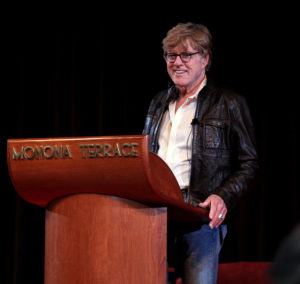HUMANIST PROFILE | Robert Redford
 Robert Redord (via Wikimedia Commons)
Robert Redord (via Wikimedia Commons) “When somebody thinks God speaks to him, you’ve got trouble… Is there an afterlife? As far as I know, this is it. It’s all we’ve got. You take your opportunities and you go for it.”
Charles Robert Redford Jr. was born August 18, 1936, in Santa Monica, California. His mother Martha, who exposed him to literature and film, died in 1955, and his father, Charles Robert Redford Sr., was a milkman who later worked as an accountant for Standard Oil. Redford attended Van Nuys High School where he got into some trouble stealing hubcaps and trespassing, and then attended the University of Colorado on a baseball scholarship but was kicked out in his second year for excessive drinking.
He then spent time working California oil fields and traveling and studying art in Europe, where he says he became more focused culturally and politically. In 1958 he married Lola Van Wagenen and they moved to New York City, where they had their first child and Redford enrolled at the American Academy of Dramatic Arts. The following year the couple’s five-month-old son died of sudden infant death syndrome and Redford poured himself into acting as a way to deal with the trauma. (He and Von Wagenen would have three more children. They divorced in 1985, and Redford later married German painter Sibylle Szaggars.)
Redford’s memorable films include The Great Gatsby, Butch Cassidy and the Sundance Kid, Jeremiah Johnson, The Sting, The Way We Were, All the President’s Men, Out of Africa, The Natural, and All Is Lost. He’s also the Academy Award-winning director of Ordinary People, A River Runs through It, Quiz Show, and other films.
In 1981 Redford founded the Sundance Institute near Park City, Utah, which to this day champions independent film through workshops, its annual film festival, and the Sundance Channel. He’s also well known as an environmentalist and conservationist, for example leading a decades-long fight to preserve the Grand Staircase-Escalante National Monument in Utah from commercial interests and for campaigning for the National Wildlife Refuge in Alaska. The Robert Redford Conservancy for Southern California Sustainability at Pitzer College was founded in 2012, and two years later he was part of the effort that led to the school divesting fossil fuel stocks from its endowment.
Redford was awarded the Presidential Medal of Freedom in 2016 at a ceremony presided over by then-president Barack Obama. Redford was described as having
captivated audiences from both sides of the camera through entertaining motion pictures that often explore vital social, political, and historical themes. His lifelong advocacy on behalf of preserving our environment will prove as enduring a legacy as his award-winning films, as will his pioneering support for independent filmmakers across America. His art and activism has continued to shape our nation’s cultural heritage, inspiring millions to laugh, cry, think, and change.
Asked in a 2005 appearance on Inside the Actors Studio what his favorite and least favorite words were, Redford answered, respectively, “possible” and “whatever.”
“I don’t believe in organized religion,” he stated in a Playboy interview in 2007 when asked if he believed in an afterlife. “I’ve explored every religion, some very deeply, enough to know there’s not one philosophy that can satisfy me. Problems can’t be solved with one way of thinking. If anything is my guide, nature is. That’s where my spirituality is.”
